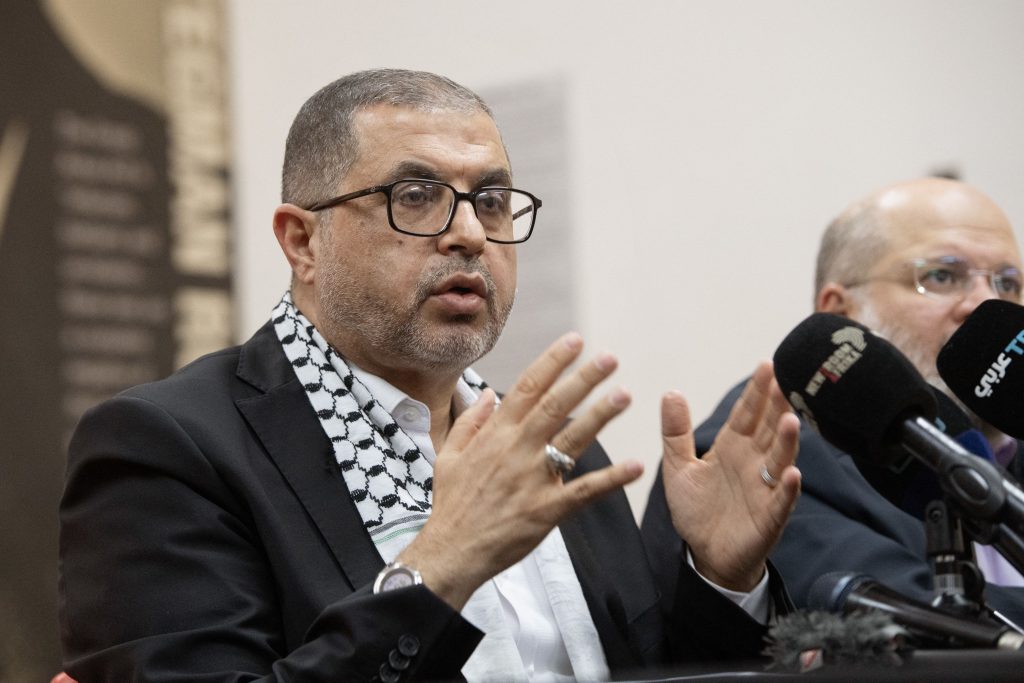By Jeremy Diamond and Abeer Salman, CNN
Jerusalem (CNN) — A senior Hamas official told CNN that he cannot provide any assurances about the wellbeing of Israeli hostages held in Gaza, but rejected a United Nations special representative’s finding that there is “clear and convincing information” that some of them have been sexually abused.
“I cannot now reassure you, anyone, because all these war prisoners are facing the same bombardment and starvation our people (are) facing on the ground,” said Basem Naim, a member of Hamas’ political bureau, even as he “absolutely” denied the allegations of sexual abuse.
In a wide-ranging and sometimes contentious Zoom interview from his office in Istanbul, Turkey, Naim spoke to CNN on Wednesday about the state of ceasefire negotiations with Israel, the fate of 130 Israeli hostages still held by Hamas, and Hamas’ share of responsibility for the widespread devastation unleashed by the Israeli military in Gaza in response to the October 7 terrorist attacks that killed more than 1,200 people.
During the interview, Naim rejected defining Hamas’ attacks as terrorism, falsely claiming that his organization does not target civilians. Instead, he blamed Israel for carrying out what he claimed is “state terrorism” in Gaza and reiterated Hamas’ calls for Palestinians to join in “armed resistance” against Israel during the Muslim holy month of Ramadan, which began Sunday night.
Israel has denied targeting civilians and accuses Hamas of hiding behind civilian infrastructure. More than 31,000 people, a majority of whom are women and children, have been killed in Gaza since the Israeli military campaign began, according the health ministry in the enclave.
Fate of hostages, sexual violence allegations
A week after a United Nations team led by UN special representative PramilaPatten said it found “clear and convincing information” that some women held hostage by Hamas had been raped or sexually abused, and that there were “reasonable grounds” to believe the sexual violence was ongoing, Naim said he “absolutely” denied the allegations.
“She was not able to show any proof and solid evidence from an eyewitness,” Naim said. “She hasn’t met any of the victims.”
Patten’s team interviewed 34 people, obtaining firsthand accounts from released hostages as well as testimony from survivors, and witnesses, health and service providers, and first responders to the October 7 attack.
“Based on the first-hand accounts of released hostages, the mission team received clear and convincing information that sexual violence, including rape, sexualized torture, and cruel, inhuman and degrading treatment occurred against some women and children during their time in captivity,” the UN report says.
Hamas has denied international organizations any access to those hostages still in captivity to assess their wellbeing.
While Naim denied the allegations of sexual violence, he said Hamas was unable to account for the wellbeing of the hostages because of the continued bombardment of Gaza. A ceasefire, he said, was necessary to “collect more data” about their fate.
The odds of a ceasefire agreement materializing remain uncertain.
For weeks, mediators have described the deal as one that would happen in multiple phases, and the first stage would see the fighting pause for about six weeks and the release of around 40 Israeli hostages and a large number of Palestinians.
Hamas’ latest, long-awaited ceasefire proposal calls for Israel to release between 700 and 1,000 Palestinian prisoners, in exchange for Hamas releasing Israeli women – including IDF soldiers – children, elderly, and wounded and sick hostages, a diplomatic source familiar with the discussions told CNN on Friday, confirming earlier reporting by Reuters.
The proposal envisions that a permanent ceasefire would be agreed upon after that initial exchange of hostages and prisoners, as well as a deadline for an Israeli withdrawal from Gaza.
Hamas has consistently demanded a permanent ceasefire and the pullback of Israeli troops as a condition of any deal, which the Israeli government has rejected.
Upon receiving the latest proposal, the Israeli Prime Minister’s office called it “ridiculous” and said Thursday that “Hamas is continuing to hold to unrealistic demands,” but an Israeli delegation is being sent to Doha, Qatar for further talks.
“Our impression is it is not going to be easy to convince the Israelis of this,” the diplomat said.
Pressed on why Hamas would not accept a temporary ceasefire amid the urgent humanitarian situation in Gaza, where the UN says half-a-million people are on the brink of famine, Naim blamed the Israeli government and said Hamas would be “naive” to agree to a temporary ceasefire. Naim spoke to CNN before details of the latest Hamas proposal emerged.
“Do you believe that we are so naive to accept going for a temporary humanitarian ceasefire for six weeks or two months to give the Israelis all what (they are) looking for?” Naim said. “I think any, any rational politician around the world, he will expect to reach a permanent quiet, a permanent ceasefire so that we can go from this point out to relieve the people on the ground to rebuild the Gaza Strip again.”
Asked for a response to Naim’s remarks, an Israeli government official said: “Prime Minister Netanyahu’s government has freed 112 hostages to date and is committed to free all the hostages. Once Hamas’ delusional demands come down to earth, there can be another humanitarian pause for a hostage release deal,” the official said.
Israel has limited the amount of humanitarian aid entering key parts of the Gaza Strip and is responsible under international humanitarian law for ensuring that Gaza’s civilian population does not starve.
As for Hamas’ responsibility?
“First of all, yes, we have all the responsibility towards our people. And therefore, from day one, we have looked for ending this aggression and stopping the slaughter of our people. And we have contacted all the mediators to reach a final, total ceasefire. But you are accusing Hamas, as if we are the ones who are committing all these crimes, and who are blocking all the humanitarian aid to come into Gaza,” Naim said.
In recent weeks, many civilians in Gaza have increasingly blamed Hamas for the mounting starvation. When speaking about the distribution of aid, displaced individuals accused Hamas of taking humanitarian aid meant for civilians and taking it for its fighters.
Naim denied the claims, asserting that Hamas was “fighting for the people, and not fighting against the people.”
Ramadan and the ‘month of jihad’
The interview came during the first week of Ramadan, which has been a flashpoint in the Israeli-Palestinian conflict in previous years. This year, it comes against the backdrop of the ongoing war in Gaza, Israeli crackdowns on Palestinian militant groups in the occupied West Bank and Hamas’ calls for more attacks.
Ahead of the interview, Hamas issued a statement calling on the Palestinians in the occupied West Bank “to continue clashing with the Zionist occupation in support of the blessed Al-Aqsa Mosque and our steadfast people in Gaza, especially as we experience the blessings of the holy month of Ramadan, the month of jihad and resistance.”
Naim said Palestinians have a right to pursue “freedom and dignity” and an independent state with Jerusalem as its capital through both diplomatic means and what he called “armed resistance.”
But pressed on whether Hamas is seeking to inspire terrorist attacks against Israel during Ramadan, Naim rejected that label.
Naim also insisted that Hamas does not target civilians, but Israeli settlers armed with weapons and those responsible for violence against Palestinians in the occupied West Bank.
Hamas killed hundreds of civilians – including women and children – during its attack on October 7 and has targeted civilians for years, in addition to carrying out attacks on Israeli forces.
CNN’s Alex Marquardt contributed to this report.
The-CNN-Wire
™ & © 2024 Cable News Network, Inc., a Warner Bros. Discovery Company. All rights reserved.






More Stories
Weather forecast: Thursday, May 9, 2024
BNA responds to incident at Netball Stadium
Support continues for families displaced by fire